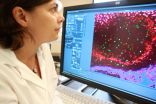(Press-News.org) LOS ANGELES (May 14, 2015) - Millions of people afflicted by irritable bowel syndrome can now be diagnosed quickly and accurately with two simple blood tests developed by a Cedars-Sinai gastroenterologist.
The tests, created by Mark Pimentel, MD, director of the GI Motility Program and Laboratory, confirm when a patient has developed IBS because of food poisoning, a major cause of the disorder.
Toxins produced by bacteria, such as salmonella, can severely harm the digestive system by damaging nerves critical to healthy gut function. The new blood tests identify the presence and amount of specific antibodies reacting to the toxins.
"Having an early diagnosis means patients can avoid years of invasive tests and visits to specialists that often leave them with more questions than answers," he said. "With these new blood tests, many patients will now be able to proceed right to therapy for their condition."
IBS is the most common gastroenterological disorder in the United States, affecting nearly 40 million people. An estimated 10 percent of the world's population suffers from the condition.
The disorder, nearly impossible to diagnose until now, is characterized by a cluster of confounding symptoms that include chronic bloating, abdominal pain, gas, and bouts of relentless diarrhea, constipation, or both. Fatigue and the stress of trying to plan one's life around visits to the bathroom can be debilitating.
A multicenter study validating the accuracy of the new blood tests, "Development and Validation of a Biomarker for Diarrhea-Predominant Irritable Bowel Syndrome in Human Subjects," was published this week in the journal PLOS ONE. Pimentel will also present the research on Sunday, May 17th, at Digestive Disease Week 2015 in Washington, D.C.
Pimentel and fellow researchers studied nearly 3,000 people, comparing IBS patients to those diagnosed with inflammatory bowel disease, celiac disease and those with no GI disease. The blood tests identified the two antibodies associated with IBS -- anti-Cdtb and anti-vinculin -- with greater than 90 percent certainty.
The tests are marketed under the name IBSchek™ and are produced by Commonwealth Laboratories Inc., in Salem, Massachusetts.
"Most IBS patients have been told at one time or another that the disease was psychological, all in their head," said Pimentel. "The fact that we can now confirm the disease through their blood, not their head, is going to end a lot of the emotional suffering I have seen these patients endure."
For more information on IBS and the new blood test for the disorder, watch this video:
First Ever Blood Test for IBS
COI Disclosure: Pimentel receives consulting fees from Commonwealth Laboratories.
Cedars-Sinai has entered into an exclusive license agreement with Commonwealth Laboratories for several patent applications covering the blood tests, developed by Pimentel to detect both anti-CdtB and anti-vinculin antibodies in the diagnosis of irritable bowel syndrome and inflammatory bowel disease.
INFORMATION:
Researchers have published results in Environmental Research Letters confirming strong warming in the upper troposphere, known colloquially as the tropospheric hotspot. The hot has been long expected as part of global warming theory and appears in many global climate models.
The inability to detect this hotspot previously has been used by those who doubt man-made global warming to suggest climate change is not occurring as a result of increasing carbon dioxide emissions.
"Using more recent data and better analysis methods we have been able to re-examine the global weather ...
A new report by the Nuffield Council on Bioethics calls for a change in culture across all areas of children's health research, so that children's and young people's views and opinions can help to shape how research is prioritised, designed and reviewed. Unless ethical concerns about asking children to take part in research are addressed, our understanding of childhood disorders and ability to provide evidence based care will remain limited.
"It will always be easier to say 'no' to research with children on the grounds that it's too difficult, but we should challenge ...
A new Australian study shows that cells which form the bulk of our fast-acting 'innate' immune system behave differently, depending on whether an injury is infected or not.
It is well known that paparazzi-like 'neutrophils' swarm to sites of injury within minutes to undertake damage control and kill invaders. Most have very short lives and self-destruct once their job is done.
Sydney researchers now demonstrate that in certain cases neutrophils can also enlist reinforcements in their fight against pathogens. If the injury is infected, neutrophils seek out accomplices ...
A ground-breaking discovery by Monash University researchers could revolutionise treatments given to lupus sufferers, saving thousands of people each year from serious illness or death caused by secondary infections.
Lupus is a vicious and widespread autoimmune disease that can attack any part of the body. It affects one in 1,000 Australians and 5 million people worldwide, and its victims are typically young women. Indigenous and Asian people suffer higher rates than other groups.
Current treatments for lupus essentially 'switch off' the patient's immune system to stop ...
This news release is available in Spanish.
Compelling clinical activity of PM1183 in second line, achieving 67% response rate and a progression-free survival of 4.7 months in patients with small cell lung cancer (SCLC), a type of tumor with very limited treatment alternatives
Data from an interim analysis from the pivotal Phase 3 trial of YONDELIS® in soft tissue sarcoma, SAR-3007, will be presented in an oral presentation
Phase 2 data showcase activity of YONDELIS® in malignant pleural mesothelioma, a rare form of lung cancer that is largely related ...
Even a busy job may not provide enough exercise to meet current activity recommendations for the prevention of cardiovascular disease, according to a study reported today at the EuroPRevent congress in Lisbon.1
Dr Eleanor McIntyre from the Galway University Hospital in Ireland said that the workplace - where most adults spend around 60% of their waking hours - "represents a significant domain where short bouts of physical activity can be accrued and counted towards the recommended guidelines" for CVD prevention. However, results from this small study, which assessed the ...
WASHINGTON (May 13, 2015) -- An early phase study testing an anti-PDL1 agent in combination with standard chemotherapy in the treatment of advanced non-small cell lung cancer has provided promising early results, prompting multiple phase III studies in lung cancer. The findings are being presented at the annual meeting of the American Society of Clinical Oncology (ASCO).
In this phase 1b study, patients with untreated non-small cell lung cancer received one of three standard platinum-based chemotherapy regimens (paclitaxel/carboplatin, pemetrexed/carboplatin or nab-paclitaxel/carboplatin) ...
MANHATTAN, Kansas -- Our belief in pure evil influences our feelings about capital punishment, finds a Kansas State University psychology study.
Donald Saucier, associate professor of psychological sciences and 2015-2016 Coffman chair for distinguished teaching scholars, looked at how beliefs in pure evil influenced how people treated those who committed crimes. He recently completed the study with Russell Webster at St. Mary's College of Maryland.
Approximately 200 participants were given a summary of a case in which a murderer confessed to his crime. Researchers then ...
AURORA, Colo. (May 14, 2015) - More than half of all Medicaid enrollees prefer the "one-stop shop" of a hospital emergency department to receive care for conditions that could be treated effectively at a primary care clinic, according to an article by a researcher at the University of Colorado School of Medicine on the Anschutz Medical Campus.
The finding exposes a gap in the services provided to Medicaid enrollees. From a patient's perspective, going to the hospital emergency department may be less expensive because patients can avoid costs of travel and time away from ...
PHILADELPHIA - In the first-of-its-kind study since the passage of the HIV Organ Policy Equity Act (the HOPE Act), which lifted the ban on organ donations from one HIV-positive person to another, Penn Medicine researchers report on the quality of these organs and how their use might impact the country's organ shortage. The study, published online ahead of print May 14 in the American Journal of Transplantation, revealed that there are nearly 400 HIV-positive potential organ donors who could be sources of donated organs annually for HIV-positive patients waiting for organ ...

